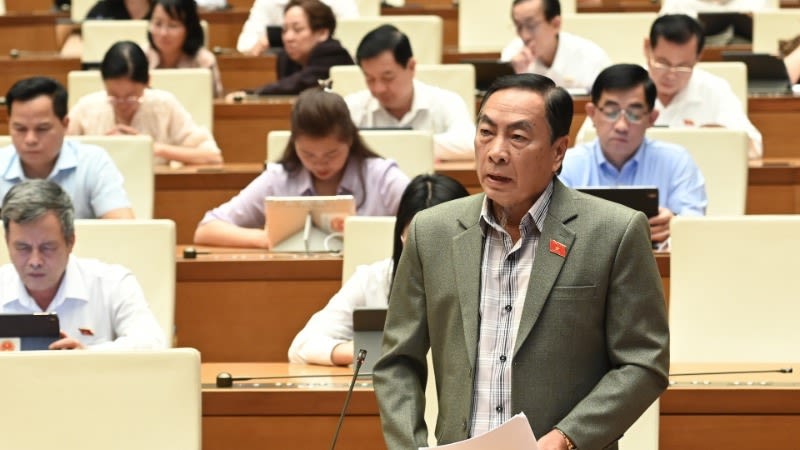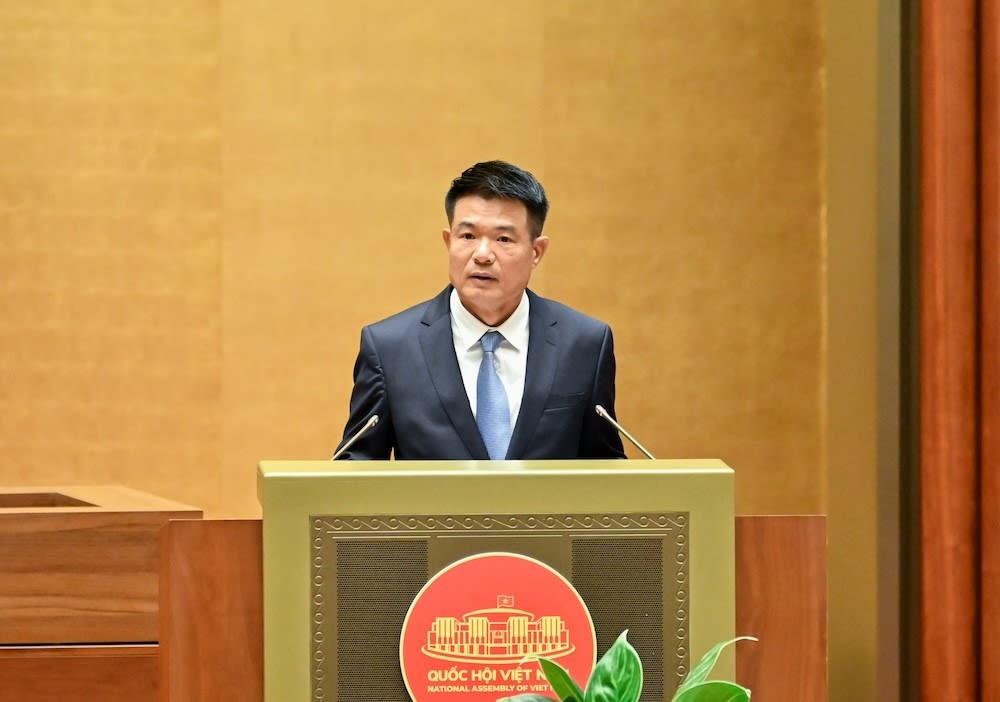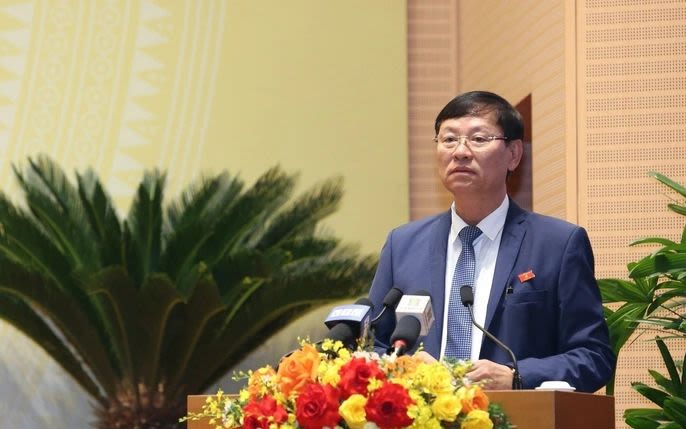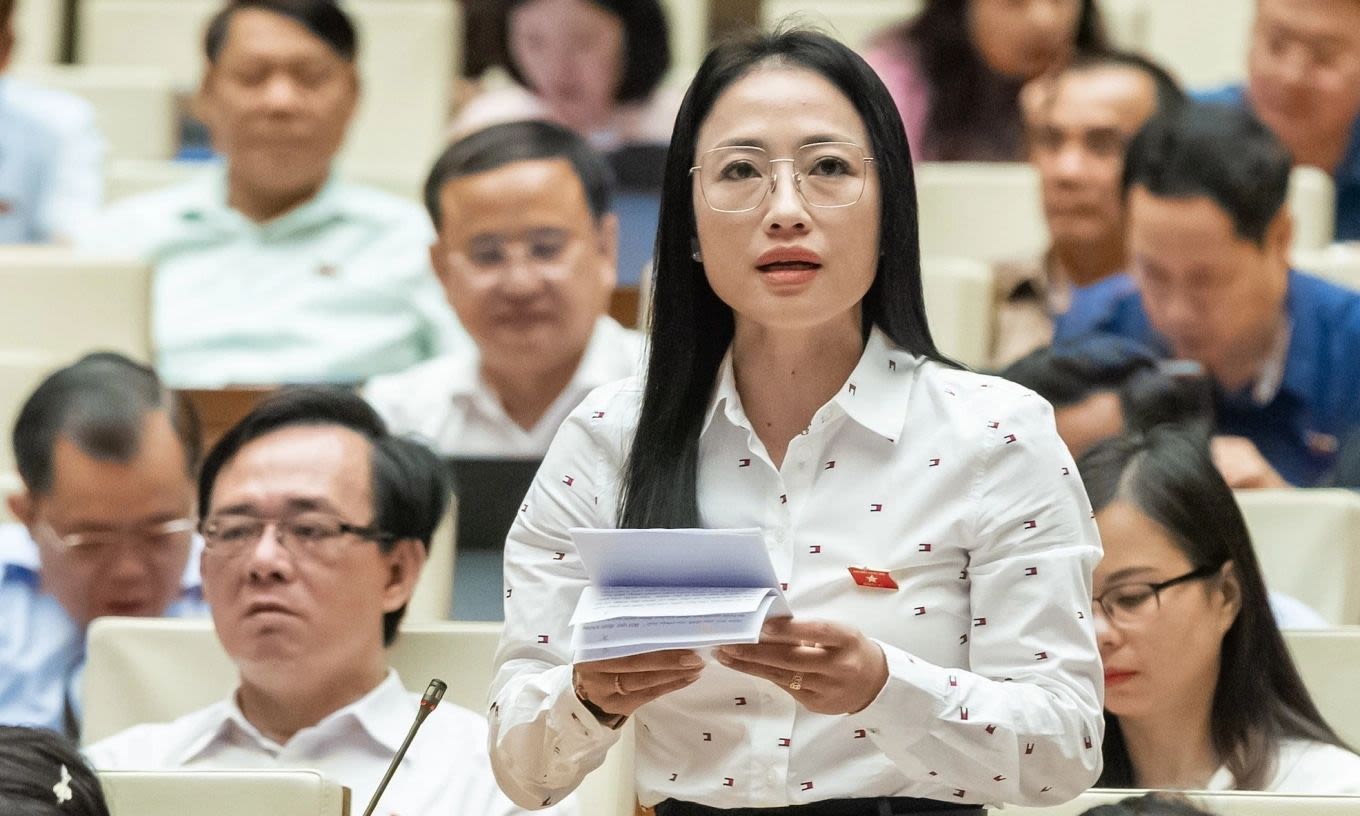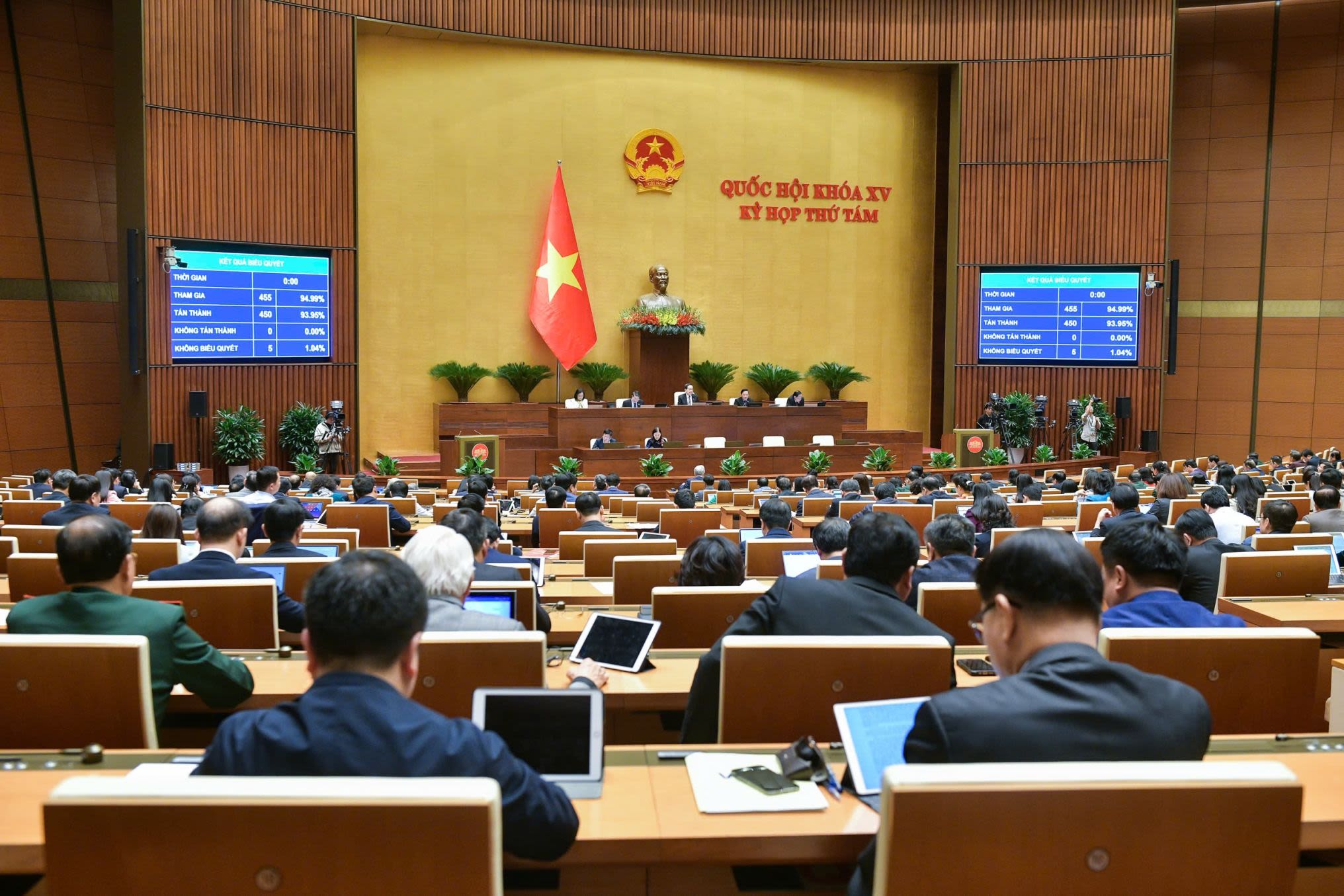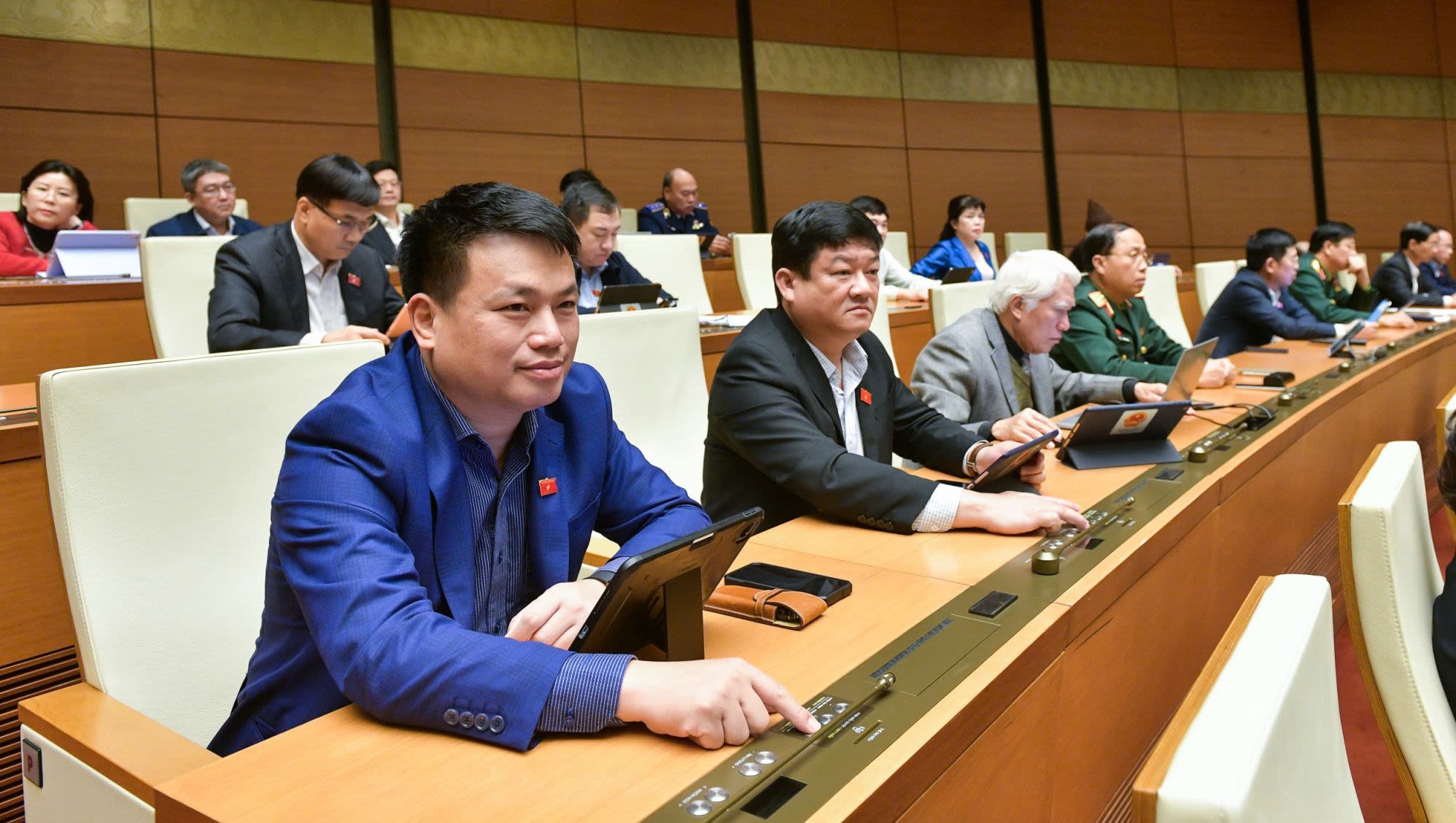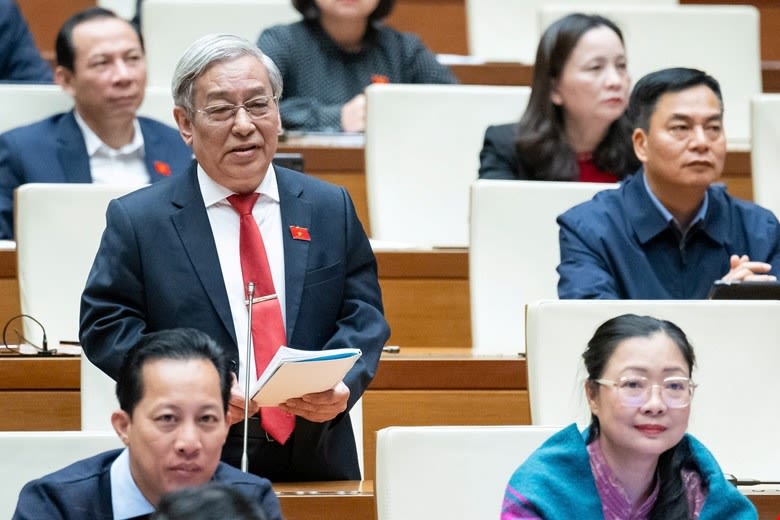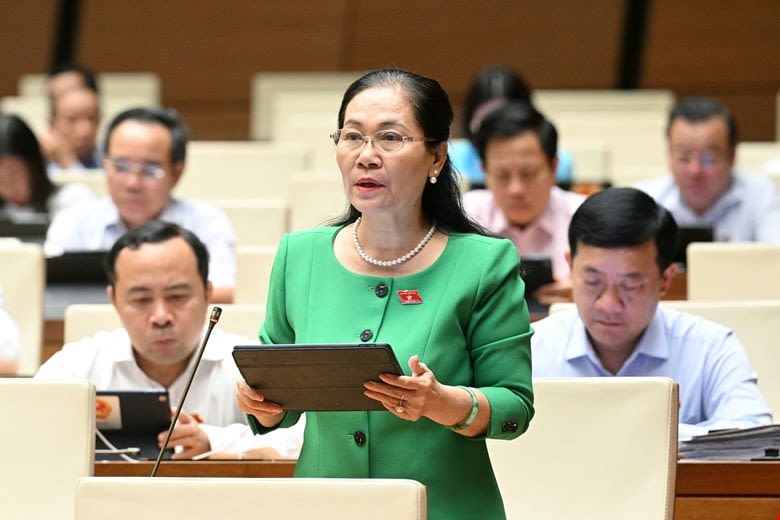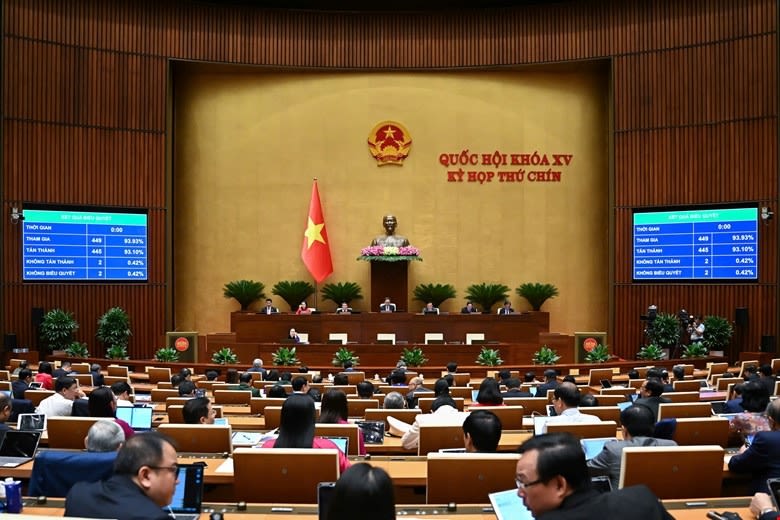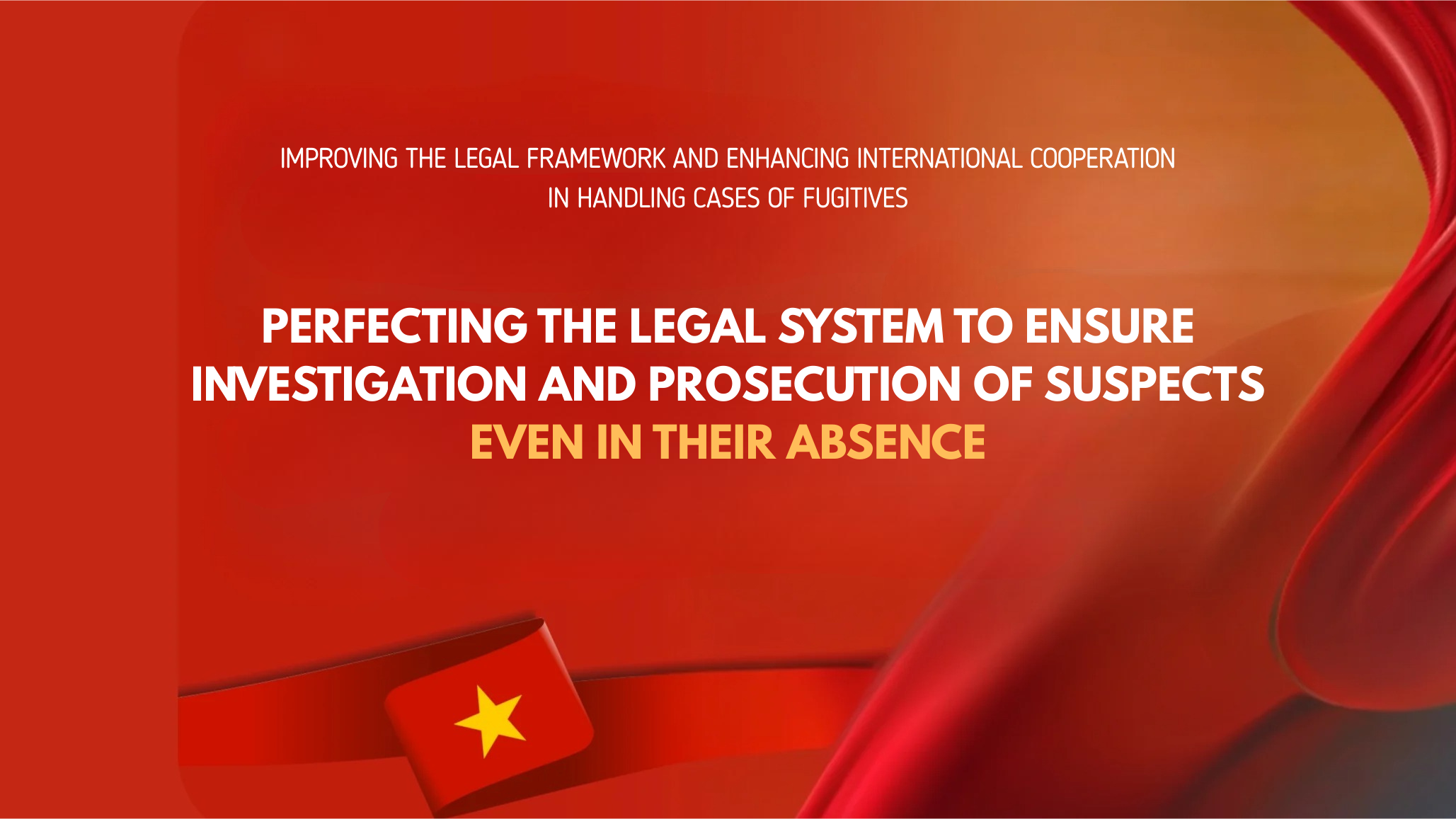
IMPROVING THE LEGAL FRAMEWORK AND ENHANCING INTERNATIONAL COOPERATION IN HANDLING CASES OF FUGITIVES
In recent years, the prevention, combat, and handling of crimes — especially cases involving suspects and defendants fleeing abroad — has received special attention and decisive direction by the Party and State of Viet Nam, achieving significant results.
However, against the backdrop of deep integration, the phenomenon of suspects and defendants absconding overseas has become increasingly complex. At the same time, handling cases in absentia or arranging extradition back to Viet Nam faces numerous difficulties. This situation calls for urgent enhancement to the effectiveness of international cooperation in criminal justice and security diplomacy.
At the 9th session of the 15th National Assembly (NA), a law amending and supplementing certain articles of the Criminal Procedure Code. NA deputies also discussed and gave opinions on the draft Law on Mutual Legal Assistance in Criminal Matters and the draft Law on Extradition.
These are important steps demonstrating the high determination of the National Assembly, the Government, the Ministry of Public Security, the Supreme People’s Procuracy, and relevant agencies to continue perfecting the legal framework, strengthening international cooperation, and enhancing the effectiveness of security diplomacy and criminal justice assistance.
The overarching goal is to promptly and effectively handle cases involving fugitive suspects, ensuring there is no legal vacuum, in line with the Party and State’s guidelines.
In this coverage, Nhan Dan Newspaper will clarify the current situation, causes, and propose some key solutions to contribute to improving the fight against this type of crime in the present period.
Given the complicated reality of many accused fugitives fleeing abroad, the Party and State have resolutely directed the improvement of the legal system to meet practical requirements in the fight against crime. The focus is on provisions for dealing with assets and evidence to prevent loss, allowing investigation, prosecution, and trial even when suspects or defendants are absent, thus ensuring the law is strictly upheld with no “legal gaps” in handling cases. This marks an important advancement, reflecting a renewed mindset in building the socialist rule of law in Viet Nam.
A distressing reality
In recent years, as the Party and State have strongly promoted crime prevention and handling, especially in the criminal field, a series of particularly serious and complex cases involving economic crimes and corruption with significant losses have been rigorously investigated, prosecuted, and tried.
Notably, in some cases, certain suspects who once held key positions in state agencies or enterprises exploited legal loopholes and delays in applying procedural measures to flee abroad before authorities could proceed with legal actions. This not only complicates case handling but also causes delays in asset recovery, leading to loss and waste of the State’s resources.
This reality highlights the urgent need to perfect the legal framework and strengthen judicial cooperation and security diplomacy to effectively prevent escapes, ensuring there are no “safe havens” for criminals either within or outside the territory.
NA deputy Pham Van Hoa (Dong Thap) speaks at the 9th session of the 15th National Assembly. (Photo: BUI GIANG)
NA deputy Pham Van Hoa (Dong Thap) speaks at the 9th session of the 15th National Assembly. (Photo: BUI GIANG)
National Assembly Deputy Pham Van Hoa (Dong Thap delegation) highlighted the reality that there have been cases in recent times where, after the Investigation Agency initiated legal proceedings, suspects had “fled far away”, leaving the territory of Viet Nam. Therefore, according to the deputy, supplementing regulations on investigation and prosecution in absentia is extremely necessary, consistent with the country’s actual circumstances and “in line with the people’s will”.
“It is unacceptable that after committing wrongdoing and violating Viet Nam’s laws, one seeks every way to escape abroad, as if everything has settled down peacefully, with no way to handle it,” said Hoa.
It is unacceptable that after committing wrongdoing and violating Viet Nam’s laws, one seeks every way to escape abroad, as if everything has settled down peacefully, with no way to handle it.
~ Deputy Pham Van Hoa
The opinion of Deputy Pham Van Hoa also reflects the common voice of a large number of voters and citizens nationwide. Over the past period, the Party and the State have been paying strong attention to this issue, as when suspects abscond, the process of prosecution and trial faces many difficulties. At the same time, the handling and recovery of assets, especially those of great value, aiming to avoid loss and waste, also encounters numerous obstacles.
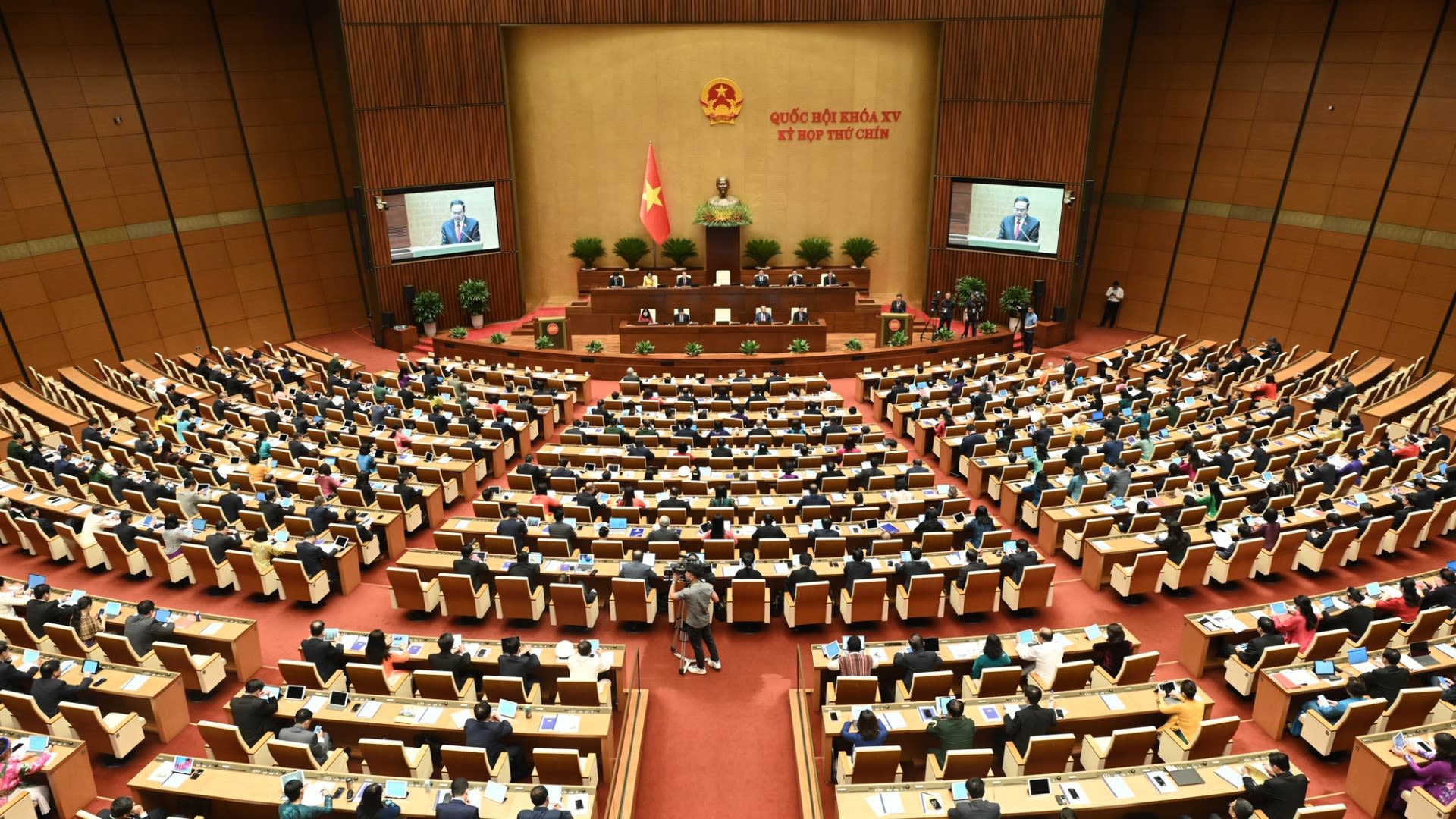
In his presentation at the 9th session of the 15th National Assembly recently, Nguyen Huy Tien, Prosecutor General of the Supreme People’s Procuracy, stated that in reality there have been many particularly serious cases causing extremely large damage to the assets of agencies, organisations, and individuals, yet suspects have absconded, warrants have been ineffective, or suspects cannot be summoned from abroad. The criminal acts of these suspects are closely linked to the offences of other suspects in the case.
Prosecutor General of the Supreme People’s Procuracy Nguyen Huy Tien speaking at the 9th session of the 15th National Assembly. (Photo: DUY LINH)
Prosecutor General of the Supreme People’s Procuracy Nguyen Huy Tien speaking at the 9th session of the 15th National Assembly. (Photo: DUY LINH)
According to the prosecutor general, although the proceedings-conducting agencies had sufficient grounds to prove the criminal acts and had issued an investigation conclusion proposing prosecution, they still had to decide to temporarily suspend investigation/suspend the case, as prosecution in absentia could not be carried out. This has greatly affected the timely settlement of cases, the handling of other suspects involved, and the recovery of assets.
Accordingly, the Criminal Procedure Code (prior to being amended and taking effect on July 1, 2025) only provided regulations on trial in absentia under Article 290, without specific provisions on the procedures for this during the investigation and prosecution stages.
To resolve the aforementioned obstacles, Prosecutor General Nguyen Huy Tien stated that the competent authorities have requested and directed agencies to develop guidelines on the procedures for investigating, prosecuting and trying suspects and defendants in absentia in cases where there is already sufficient evidence to settle the case, thereby ensuring the strictness of the law and deterring offenders intending to abscond.
In reality there have been many particularly serious cases causing extremely large damage to the assets of agencies, organisations, and individuals, yet suspects have absconded, warrants have been ineffective, or suspects cannot be summoned from abroad.
~ Prosecutor General Nguyen Huy Tien
In practice, the proceedings-conducting agencies have coordinated and implemented investigation, prosecution and trial in absentia for many suspects and defendants in major cases, recovering many assets of significant value, gaining public consensus and support. Among them, prosecution, investigation, and trial in absentia have been carried out against Nguyen Thi Thanh Nhan and several others in the AIC Dong Nai case.
Therefore, it is necessary to promptly supplement regulations on the grounds and circumstances for investigation and prosecution in absentia in the Criminal Procedure Code in order to have a specific legal basis for implementation.
Handling of physical evidence and assets during the process of investigation, prosecution and trial to avoid waste
National Assembly Deputy Nguyen Huu Chinh (Ha Noi delegation)
National Assembly Deputy Nguyen Huu Chinh (Ha Noi delegation)
NA deputy Nguyen Huu Chinh (Hanoi delegation) stated that, in reality, many major cases are complex and the investigation period is prolonged. Some cases last from one to two years, or longer, and by the time the court settles them, the exhibits such as workshops, equipment, machinery, and vehicles are almost damaged, unusable, reduced to scrap, causing waste and significant losses to the involved parties.
NA deputy Tran Khanh Thu (Thai Binh delegation, now Hung Yen)
NA deputy Tran Khanh Thu (Thai Binh delegation, now Hung Yen)
Sharing the same view, NA deputy Tran Khanh Thu (Thai Binh delegation, now Hung Yen Province) stated that many major cases often drag on for years, leading to a situation where related assets are not handled in a timely manner. Some assets that should have been dealt with early in the process of investigation and prosecution were delayed until the court trial, causing waste as the assets were not exploited or used effectively.
Furthermore, according to the deputy, even when defendants, accused persons, or victims wish to have assets handled, or to pay compensation to mitigate consequences in order to be considered for leniency, they still have to wait until the trial stage. By that time, the value of the assets may no longer be intact, and they may already be damaged or degraded, creating difficulties for valuation and settlement.
On the morning of November 28, 2024, the NA adopted a Resolution on the pilot handling of exhibits and assets during the investigation, prosecution, and trial of certain criminal cases, with a high approval rate.(Photo: quochoi.vn)
On the morning of November 28, 2024, the NA adopted a Resolution on the pilot handling of exhibits and assets during the investigation, prosecution, and trial of certain criminal cases, with a high approval rate.(Photo: quochoi.vn)
Difficulties in handling evidence and assets in criminal cases have existed for many years. To gradually resolve these issues, at the eighth session on November 28, 2024, the 15th NA voted to adopt the Resolution on piloting the handling of evidence and assets during the investigation, prosecution, and trial of certain cases and criminal proceedings, with very high approval (450 of 455 deputies voted in favour). This Resolution takes effect on January 1, 2025, and runs for three years.
The issuance of the Resolution aims to promptly implement Conclusion No. 87-KL/TW dated July 13, 2024, of the Politburo. It creates a legal basis to remove obstacles and meet practical requirements in resolving cases and criminal proceedings under the monitoring and direction of the Central Steering Committee for Prevention and Control of Corruption, Wastefulness, and Negative Phenomena. This will improve the effectiveness of the fight against crime, especially economic and corruption-related crime, better ensure the legitimate rights and interests of related organisations and individuals, and minimise negative impacts on the investment and business environment.
Deputies pressed the button to approve the Resolution on the pilot handling of exhibits and assets during the investigation, prosecution, and trial of certain cases and criminal proceedings. (Photo: quochoi.vn)
Deputies pressed the button to approve the Resolution on the pilot handling of exhibits and assets during the investigation, prosecution, and trial of certain cases and criminal proceedings. (Photo: quochoi.vn)
At the same time, the Resolution also aims to fully institutionalise the Party’s policies and orientations, particularly the requirements on developing and perfecting laws on detecting and handling corruption cases and on mechanisms for asset recovery; and it is consistent with the provisions of international conventions to which Viet Nam is a party.
Accordingly, the Resolution stipulates the pilot handling of exhibits and assets seized, temporarily kept, distrained, or frozen during the process of addressing crime reports, investigation, prosecution, and trial of criminal cases under the supervision and direction of the Central Steering Committee for Prevention and Control of Corruption, Wastefulness, and Negative Phenomena.
This Resolution applies to the following entities: Procedural authorities and persons conducting proceedings as prescribed by the Criminal Procedure Code; participants in proceedings as prescribed by the Criminal Procedure Code; and other relevant agencies, organisations, and individuals.
Notably, the Resolution stipulates measures for the handling of exhibits and assets, including the return of funds to victims or the deposit of such funds into a bank account pending further legal disposition; the provision of a financial guarantee to cancel seizure, temporary custody, attachment, or freezing of exhibits or assets; the sale or transfer of ownership of exhibits and assets, along with the disposal of proceeds collected from such transactions; the transfer of exhibits or assets to their lawful owners or legal custodians for the purposes of management, exploitation, or use; the temporary suspension of transactions and the postponement of registration or transfer of ownership or usage rights of assets; any income or profits generated in the course of handling exhibits and assets, in accordance with this Resolution, is disposed of in accordance with the judgments or decisions of the Court; the authority and procedural order for determining the application or cancellation of these handling measures of exhibits and assets; disputes regarding ownership rights over exhibits or assets subject to such measures shall be resolved pursuant to the provisions of civil procedural law.
Completing the legal framework for investigation and prosecution in case of fleed defendant
The pilot handle of exhibits and assets during the investigation, prosecution and adjudication phases of criminal cases are a significant advancement, contributing to improving procedural efficiency and limiting asset dissipation or wastage. Notably, at the 9th session, the 15th National Assembly voted to adopt the Law amending and supplementing a number of articles of the Criminal Procedure Code, which sets out detailed procedures for conducting investigation and prosecution in cases where the accused is absent due to absconding. This marks a critical step toward perfecting a more coherent and synchronous criminal procedure framework, particularly in the adjudication of complex economic and corruption-related cases involving suspects seeking to evade criminal liability.
NA Deputy Le Xuan Than (Khanh Hoa delegation). (Photo: quochoi.vn)
NA Deputy Le Xuan Than (Khanh Hoa delegation). (Photo: quochoi.vn)
Expressing his opinion on the matter, NA Deputy Le Xuan Than (Khanh Hoa delegation) expressed his strong support for the supplement of provisions relating to the investigation, prosecution and trial of accused persons or defendants who are no longer present in Viet Nam at the time of case initiation. According to him, these supplemented contents are essential to ensure procedural process — preventing both wrongful impunity and wrongful conviction — while safeguarding the right to self-defence and the right to legal representation for defendants tried in absentia.
NA Deputy Nguyen Thi Le (Ho Chi Minh City delegation). Photo: quochoi.vn
NA Deputy Nguyen Thi Le (Ho Chi Minh City delegation). Photo: quochoi.vn
Sharing this view, NA Deputy Nguyen Thi Le (Ho Chi Minh City delegation) expressed her strong support for the new provision allowing for the prosecution of accused persons who have absconded or are residing abroad and cannot be summoned.
“This is an important solution to address the backlog of pending cases, particularly complex corruption and economic cases involving flight risks, and reflects a resolute stance in the fight against crime,” she stressed.
On the morning of June 27, 2025, the NA voted to adopt the Law amending and supplementing a number of articles of the Criminal Procedure Code. Photo: quochoi.vn
On the morning of June 27, 2025, the NA voted to adopt the Law amending and supplementing a number of articles of the Criminal Procedure Code. Photo: quochoi.vn
Based on the support of majority of NA deputies, on the morning of June 27, 2025, at the 9th session, the 15th NA passed the law amending and supplementing a number of articles of the Criminal Procedure Code, with 445 out of 449 deputies present voting in favour (accounting for 93.1% of the total number of National Assembly deputies). The law took effect on July 1, 2025, and has been an important legal foundation for resolving cases, including those involving absconded accused persons and defendants.
Accordingly, Article 233 of the Criminal Procedure Code, as amended, provides that the investigating authority may issue an investigation conclusion proposing prosecution of the accused when there are sufficient grounds and the right to defence of the accused is ensured in accordance with this Code, in specific cases. Article 243 of the Code provides that the Procuracy may decide to prosecute the accused when there are sufficient grounds and the right to defence of the accused is ensured in accordance with this Code in the following cases: The accused absconds or their whereabouts are unknown and the wanted notice yields no result; the accused is abroad and cannot be summoned to participate in activities serving the decision on prosecution.
Thus, with these new provisions under the Law amending and supplementing a number of articles of the Criminal Procedure Code, our legal system has been gradually improved to establish a solid legal basis for handling cases in which the accused absconds; affirming the strictness and timeliness of the law, ensuring that the law is enforced in the fairest possible manner.
With these new provisions under the Law amending and supplementing a number of articles of the Criminal Procedure Code, our legal system has been gradually improved to establish a solid legal basis for handling cases in which the accused absconds; affirming the strictness and timeliness of the law, ensuring that the law is enforced in the fairest possible manner.
The handling of exhibits and assets during investigation, prosecution, and trial in certain criminal cases; and the completion of procedures for investigation and prosecution in cases where the accused is absent under the Law amending and supplementing a number of articles of the Criminal Procedure Code, are two of the key legal foundations for handling cases where the accused absconds, especially when fleeing abroad.
In addition, the National Assembly, the Government, the Ministry of Public Security, and relevant ministries and sectors have actively worked to improve the institutional framework, develop new laws, and amend and supplement existing laws to achieve the highest effectiveness in dealing with this type of crime.
Notably, security-related foreign affairs and cooperation between the Ministry of Public Security, judicial authorities of Viet Nam, and judicial authorities of other countries in the prevention, combat, and handling of cases in which accused persons abscond abroad have been continuously strengthened; while relevant laws have been urgently institutionalised, such as the draft Law on Extradition and the draft Law on Mutual Legal Assistance in Criminal Matters, which were recently submitted to the 15th National Assembly for consideration at its 9th session. These are important steps contributing to further promoting security-related foreign affairs and judicial cooperation to effectively handle criminal cases involving accused persons fleeing abroad.
LAW AMENDING AND SUPPLEMENTING A NUMBER OF ARTICLES OF THE CRIMINAL PROCEDURE CODE PROVIDES AS FOLLOWS:
Article 233. Conclusion of investigation in cases of proposed prosecution
2. The investigating authority may issue an investigation conclusion proposing prosecution of the accused when there are sufficient grounds and the right to defence of the accused is ensured in accordance with this Code in the following cases:
a) The accused absconds or their whereabouts are unknown and the wanted notice yields no result;
b) The accused is abroad and cannot be summoned to participate in investigative activities.
3. Within 02 days from the date of issuing the investigation conclusion proposing prosecution against the accused as prescribed in Clause 2 of this Article, the investigation conclusion must be publicly posted if it cannot be delivered to the accused.
4. The Minister of Public Security shall take the lead, in coordination with the Minister of National Defence, the Prosecutor General of the Supreme People’s Procuracy, and the Chief Justice of the Supreme People’s Court, in providing detailed regulations on Clauses 2 and 3 of this Article.
Article 243. Decision to prosecute the accused
2. The Procuracy may decide to prosecute the accused when there are sufficient grounds and the right to defence of the accused is ensured in accordance with this Code in the following cases:
a) The accused absconds or their whereabouts are unknown and the wanted notice yields no result;
b) The accused is abroad and cannot be summoned to participate in activities serving the decision on prosecution.
3. Within 03 days from the date of issuing the indictment as prescribed in Clause 2 of this Article, the indictment must be publicly posted if it cannot be delivered to the accused.
4. The Prosecutor General of the Supreme People’s Procuracy shall take the lead, in coordination with the Minister of Public Security, the Minister of National Defence, and the Chief Justice of the Supreme People’s Court, in providing detailed regulations on Clauses 2 and 3 of this Article

Published: August 2025
Production manager: Kim Phuong Binh
Content: Mai Anh, Vu Quang Canh, Nhi Thu, Giang Khoi
Photos: Nhan Dan, Quochoi.vn
